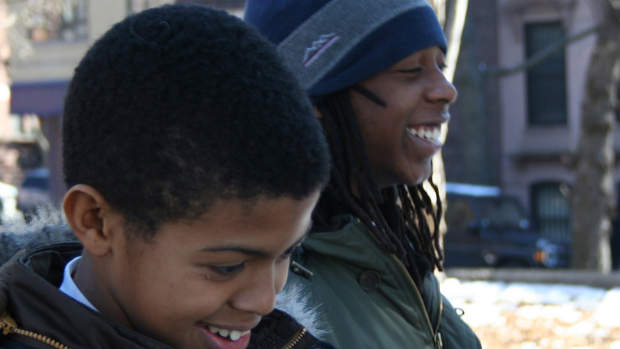 Back to selection
Back to selection
American Promise | Directors Michèle Stephenson and Joe Brewster
 American Promise
American Promise [PREMIERE SCREENING: Monday, Jan. 21, 6:00pm — Temple Theatre, Park City]
The art of filmmaking took a strange twist when we turned the camera on ourselves as well as on our loved ones. We found ourselves constantly questioning our observational and self-reflexive approach to the craft, particularly when it conflicted with our parenting ideals. As parents, we were concerned about our son’s socio-emotional development and, therefore, our impulse was to turn off the camera early and often. Yet, more often than not, the decision to turn off the camera clearly hampered the quality and emotional depth contained in the first few years of our story. Of course this set us up for a daunting dilemma that would haunt us, a Solomonesque choice between the needs of our son and our film. We would be constantly confronted with various incarnations of this dilemma over the 14 years of production.
Once we began to examine footage in the edit room during the early part of post-production, we confronted a new type of (filmmaker) torment. After the strain of filming difficult moments with our son, we were now forced to replay and relive decisions made on camera over the years, both from the vantage point of someone involved in the crafting of story and as parents. While it was becoming clear to us that the strength of our story depended on our ability to shift identities, we were losing sleep over our past mistakes and concerned about future challenges for our family. Imagine being asked, while behind the camera, by our eldest African-American son, whether he would be better off if he could change his skin color. Painful moments like these were constantly being played and replayed in our editing room then again in our late-night bedroom conversations. Halfway through our 14 year journey, we were in trouble both as filmmakers and parents, without a roadmap or book to guide us. At the same time we were fully aware of the dire statistics boys of color like our adolescent son faced. The well-being of our son’s socio-emotional health was at play from all sorts of vantage points. What did we think we were doing? We needed to figure out how to embrace a process that would allow both sides of ourselves to co-exist while benefiting the longer term health of our son.
Fortunately, the longitudinal nature of our project worked in our favor and allowed us to embrace a journey that had started off full of hopes and desires. Perhaps we would have never started if we had been fully aware. By the time we were eight years into the process, our son wanted out of Dalton, Dalton wanted out of the project and the Summers family had encountered unspeakable tragedy. We fought about continuing this filmmaking journey — with ourselves, and with our son. We were involved in the making of a film that forced us to be comfortable with handling our shifting perspective, our dirty laundry and the concerns of our collaborators; the schools, parents, our staff and our boys. Yet, we were trapped. As our lives unfolded on tape, we realized we could no longer afford to stop — something in the footage, while painful, was also touching a nerve rarely explored in the African American community. This is when a light bulb began to flash in our minds. The vision for the film, and our son’s well being could be one and the same. This is the point at which our transparency as parents would be a necessary aide to helping us be the best father and mother we could be. This transparency was also required from us in order to tell the strongest story possible.
American Promise is a journey of two African American boys, their parents and the communities responsible for their rearing. The story is fraught with the peril and anxiety of the potential failure of us as parents, and of the institutions of learning, all complicated by issues of race and class. We strongly believe that being transparent about our experiences as a family in the filmmaking process allowed us to improve from our mistakes as parents — a process crucial to moving forward in the struggle to eliminate the black male achievement gap in education. The jury is still out on the film’s power, but as parents we are sleeping just a little better.
